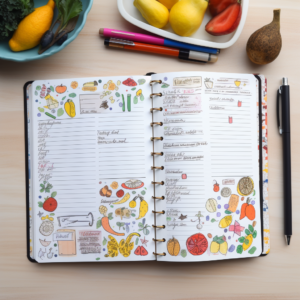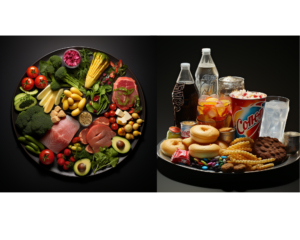
Opportunity + Perseverance = Success
Benefits of Keeping a Food Journal: A Comprehensive Guide
Are you ready to embark on a journey toward better health and a deeper understanding of your eating habits? The tool you need might be as simple as a pen and paper—or a digital device! In this article, we’ll explore the world of food journaling and discover how it can positively transform your dietary patterns.
What is a Food Journal?
Imagine having a personal diary that captures not just your thoughts and emotions but also your daily food choices. That’s essentially what a food journal is—a record of what you eat and drink. Whether you opt for a physical notebook, a digital spreadsheet, or a handy app, the idea remains: document your meals, snacks, and beverages. By jotting down not only what you consume but also when and how much, you’re creating a valuable resource that can help you gain insights into your eating patterns.
Why Keep a Food Journal?
Understanding Your Eating Habits
Let’s face it: Most of us eat on autopilot. We grab a snack here or a meal there, often without really thinking about it. This is where a food journal can be a game-changer. By consistently recording your food intake, you’ll start noticing patterns you might not have been aware of. Do you tend to snack when stressed? Do you skip breakfast more often than you thought? These insights help you understand why you make certain choices, enabling you to take control.
Effective Weight Management
A food journal can be your ultimate ally if you’re on a weight management journey. Studies have shown that people who track what they eat are more likely to achieve their weight goals. Why? Because a journal holds you accountable. It offers a transparent overview of your dietary patterns, simplifying the process of pinpointing areas where you can opt for healthier options or cut down on extra calories.
How to Start a Food Journal
Now that you’re excited about keeping a food journal let’s dive into how to start this transformative journey.
Choose Your Format
The first decision you need to make is the format of your journal. Would you prefer the tactile experience of writing in a physical notebook? Or do you find digital options more convenient? There are also specialized apps designed specifically for food tracking. Consider your lifestyle and preferences when making this choice.
Set Realistic Goals
Before you start jotting down your meals, take a moment to define your goals. Are you looking to shed a few pounds, improve your energy levels, or become more mindful of what you eat? Setting clear intentions will give purpose to your journaling efforts and keep you motivated.
Be Consistent
Consistency is crucial to the success of your food journal. Make a commitment to record everything you eat and drink every day. Be sure to write it down, whether it’s a big family dinner or a small snack. Consistency helps you build a comprehensive picture of your eating habits, which in turn helps you make meaningful changes.
The Link Between Food Journaling and Dietary Patterns
You’ve embarked on the journey of food journaling. Now it’s time to delve into how it can reveal the connection between your journal and your dietary patterns.
Awareness of Portion Sizes
Ever finish a bag of chips without even realizing it? Portion sizes can be deceiving, and that’s where your food journal comes to the rescue. You become more conscious of portion sizes by keeping track of the amounts you eat. This awareness helps you manage your portions better, ultimately contributing to healthier eating habits.
Identifying Emotional Eating Triggers
Food isn’t just about sustenance; it’s often tied to our emotions. Stress, boredom, happiness—emotions can influence what and how much we eat. Your food diary can serve as an effective instrument for recognizing emotional eating behaviors. Do you find yourself reaching for snacks when you’re stressed? Or perhaps you indulge in treats when you’re celebrating? Recognizing these triggers empowers you to find alternative ways to cope with your emotions.
Benefits of Tracking Your Diet
Welcome to the section that reveals how tracking your diet through a food journal has many advantages beyond just keeping tabs on your meals.
Accurate Nutrient Intake Assessment
Are you getting enough of the essential nutrients your body needs? Your food journal can provide valuable insights. You can calculate your nutrient intake more accurately by recording your meals and snacks. This is particularly useful if you aim to meet specific nutritional goals, such as increasing your protein intake or reducing your sodium consumption.
Customizing Your Diet Plan
No two bodies are exactly alike, and your dietary needs are unique. With your food journal, you can tailor your diet to your specific requirements. If you’re working with a certified nutrition coach or nutritionist, the information you’ve collected becomes a valuable resource. They can analyze your journal and provide personalized recommendations that align with your goals and preferences.
Tips for Successful Food Journaling
Congratulations on your commitment to food journaling! To help you make the most of this journey, let’s explore some practical tips to ensure your journaling experience is effective and enjoyable.
Record Promptly and Honestly
The key to an accurate food journal is promptly recording your meals and snacks. The longer you wait, the more likely it is that you will forget or underestimate portion sizes. And remember, your journal is a safe space free from judgment. Be honest about what you eat; every entry contributes to a better understanding of your habits.
Include Details
A detailed food journal is a treasure trove of insight. Along with writing down what you ate, include details like how the food was prepared and the ingredients used. Did you have a handful of almonds, or was it closer to a quarter cup? These details might seem small, but they can provide valuable context for your dietary patterns.
Use Technology to Your Advantage
If you’re tech-savvy, consider using a food-tracking app. These apps often come with vast databases of foods and their nutritional information, making it easier to log your meals accurately. Plus, they can provide charts and graphs visually representing your progress, adding an extra layer of motivation. There are some wonderful free options. Check the app store on your phone to see a list of those available for your device. We’ve been using “Fat Secret” for a few years now and find it easy and intuitive.
Analyzing Your Food Journal
Congratulations! You’ve been diligently recording your food intake in your journal! Now it’s time to uncover the insights that can lead you to a healthier lifestyle. Let’s dive into how to analyze your food journal effectively.
Spotting Positive Changes
As you review your food journal, you will likely start noticing positive changes in your eating habits. You might have begun opting for snacks rich in nutrients or incorporating more fruits and vegetables into your meals. These positive shifts deserve recognition and celebration. By acknowledging these changes, you reinforce your commitment to healthier choices.
Addressing Negative Patterns
Your food journal might also reveal patterns that you’d like to address. You may notice a tendency to consume sugary treats in the late afternoon or overeat during social gatherings. Recognizing these adverse trends is the initial move toward implementing improvements. Once you know these habits, you can devise strategies to overcome them and make more mindful choices.
Staying Motivated Throughout the Process
Congratulations on the progress with your food journaling journey so far! Let’s dive into some strategies to keep your motivation high as you continue on this path toward better health.
Celebrate Small Victories
Every step forward is a victory, no matter how small it may seem. Did you choose a nutritious option at a restaurant? Did you resist the urge to snack mindlessly? Celebrate these achievements! Celebrating your achievements, even if they are small, enhances your self-confidence and strengthens your dedication to your health objectives.
Seek Professional Guidance
If you face obstacles or have queries while examining your food diary, consult a certified nutrition coach or nutritionist. These experts can provide valuable insights, helping you interpret the information in your journal and make informed choices moving forward.
The Power of Consistency and Patience
You’re on the path to making positive changes in your dietary habits. Now it’s time to discuss two essential elements that can make a significant difference: consistency and patience.
Consistency
Consistency is the glue that holds your food journaling journey together. Make it a habit to record your meals, snacks, and beverages daily. Doing so creates a comprehensive record that accurately reflects your eating patterns. Even when you indulge more than usual, don’t skip recording – every entry contributes to understanding your relationship with food.
Patience
Remember, change takes time. Your food journal won’t transform your habits overnight but will gradually illuminate areas where adjustments are needed. As you analyze your journal and make mindful choices, you’ll notice the positive impact on your well-being. Be patient with yourself, and embrace the journey with an open heart.
Conclusion
Congratulations on completing this comprehensive guide to the benefits of keeping a food journal! You now understand the power of tracking your diet, recognizing your eating patterns, and making informed choices. Your food journal is a personal companion on your journey to better health. You’re bound to see meaningful improvements in your dietary habits with consistent effort.


